Bale unrollers: Options and prices
With every new round baler that comes along, manufacturers have invariably managed to produce a machine that crams more material at greater density into every package.
It’s great for baling, transport and storage efficiency, but can pose a challenge when it comes to presenting the bales to hungry stock.
Using a bale unroller is one solution; most commonly, a tractor-mounted device with a chain and slat conveyor that, with net and wrap removed, simply unwinds the rolled-up fodder.
See also: Big tub grinders: UK options, costs and user verdicts
It’s a neat and relatively inexpensive means of dispensing silage or hay along a feed barrier – or even into a trough, with a conveyor extension fitted.
Mount the machine on a farm loader or telehandler and further opportunities are opened up – such as unwinding into a ring feeder to make it easier for stock to extract their ration.
Or into a diet feeder to give the machine an easier time mixing baled silage or straw with other ingredients.
Any number of variations are available to suit different building and feeding area layouts and sizes, and there are loading choices, too – using a separate loader with the most basic models or adding a side loading arm for greater independence.
The most common solution, though, is to go for an unroller with pull-out tines to pop a bale on board before slotting them back in to carry it to the stock.
Features and functions to consider
- Three-point linkage mounted Simplest and lowest prices, but separate loader needed
- Three-point linkage mounted with side loading arm No separate loader needed, but leading arm needs a clear run at every bale
- Three-point linkage tine-mounted Some added complexity, but tines can be used to spike and load bales, so no separate means of loading needed
- Loader or telehandler back-frame tine-mounted Some added weight and complexity but ability to spike, recover and load stacked bales, and to dispense bales over gates and barriers or into ring feeders and diet mixers
- Tilting body Can help regulate bale position on the turntable and dispensing rate, especially with in-cab hydraulic adjustment
- Reversible drive Dispense bales to left or right travelling in the same direction; useful for dead-end feed passages
- Turntable body Manually or hydraulically rotate the device through 180deg; as above and useful for rear discharge in stock pens with straw spreading device fitted
- High lift frame Enables tractor linkage mounted unrollers to clear trough or feed barrier when spreading straw
- Straw spreading device Second use for the machine (see “Want to spread bedding straw?” for options)
What’s on the market?
Altec
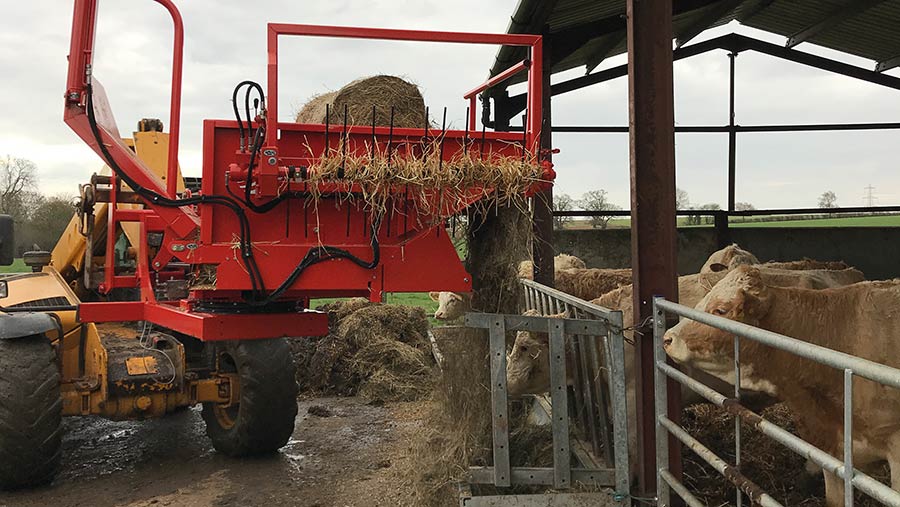
Altec DR-270 © Altec
The core product in Altec’s range of bale unrollers is the DR tractor linkage-mounted model, available in two sizes: the 160 for round bales up to 1.5m diameter, and the 200 for bales up to 2m and 1t in weight.
All variants dispense to the right from the back of a tractor, and in most basic DR-S form, the machine comes without any loading mechanism. The DR-A version adds a side-mounted hydraulic bale lifting arm.
There is also the linkage-mounted DR-P with the unrolling and dispensing assembly mounted on a turntable so it can be rotated hydraulically through 180deg to dispense to the left, right or rear.
This model is also available in two sizes – the 170 for bales up to 1.7m and the larger 200 – either without (DR-PS) or with (DR-PA) a bale loading arm.
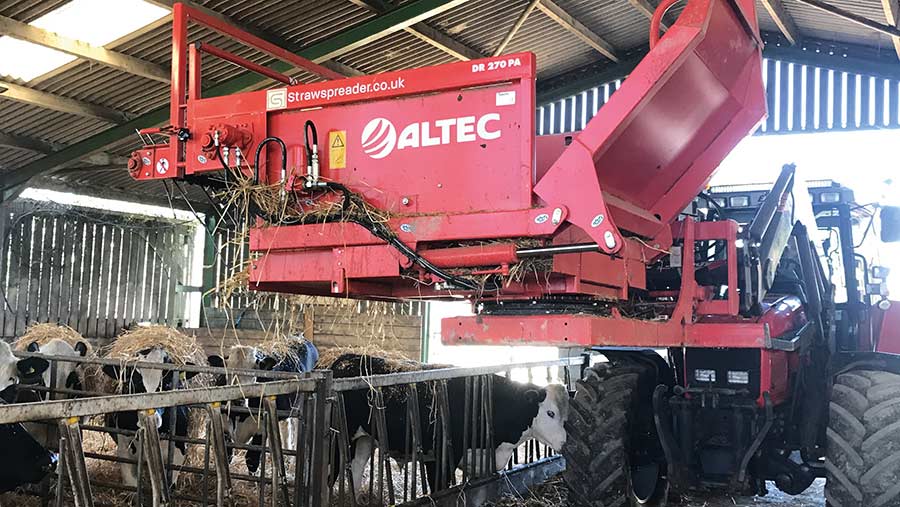
Altec DR-270 © Altec
Features common to all include a painted finish, zinc-coated self-adjusting chains for the U-shaped bale rotating and conveying slats, and a steel floor to prevent loose material falling through.
Options include loader and telehandler couplings, hydraulic left/right sideshift for the turntable versions, a 50cm hydraulic folding conveyor extension, and a 1.2m high-lift frame for dispensing straw over barriers when a spreading kit is fitted (see below “Want to spread bedding straw?”).
Prices: Basic DR-S from £6,000; DR170PA unroller with straw spreading kit, £12,000
Distributor: Straw Spreader
Bridgeway
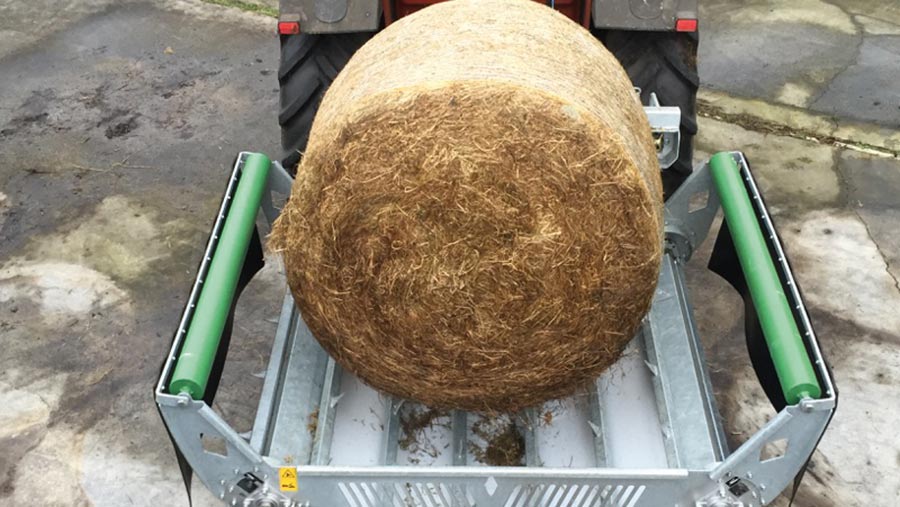
Bridgeway’s tine-loading bale unroller is fully galvanised © Bridgeway
In addition to the Roto Spike, a tractor linkage-mounted device with a hydraulically driven rotor carrying two bale tines, Bridgeway Engineering also builds the Diamond cradle-type bale unroller.
It is uniquely available with an optional weighing system so that the amount of forage dispensed can be recorded and also regulated by using the countdown to a target weight display.
This heavy-duty unit is fully galvanised and designed with a deep cradle for easier loading using the slot-in tines bolted to a back-frame that can be set up for tractor linkage or loader/telehandler mounting.
The auto-coupling hydraulic drive can be switched for right- or left-hand delivery from the spiked chain and replaceable-slat conveyor, which passes over an enclosed floor to gather up loose material.
All shafts are enclosed and side rollers, to contain large-diameter or misshapen bales, are standard, complete with hanging rubber mats for protection.
Price: £6,000 (weighing system optional)
Blaney

Blaney X10 bale forager © Blaney
The simplest model in the Blaney Agri range is the Bale Feeder X6 designed for straw, hay and silage bales of good shape and condition.
It’s available for mounting on the three-point linkage of a tractor of 75hp or more and in X6L loader-mounted form.
The mounting frame in each case carries a pair of tines that are withdrawn for loading after the unrolling bed has been unlatched, and as the tines are of different lengths, only the longer one has to be accurately positioned to re-engage.
A hydraulic motor that engages automatically with lugs on the drive roller is used to power the conveyor with its spiked slats, heavy-duty chain and hardened rollers to left or right.
Blaney’s Forager X10 tractor-mounted and X10L loader-mounted unroller can be had with an adapter that allows it to be used on either host vehicle without a lot of change-over fuss.
It’s a larger, more heavily-built machine than the X6 and is designed to cope with soft, misshapen bales as well as ones in good shape.
An extension arm and roller kit is available to fit above the ends of the two-way chain-and-slat conveyor.
Replaceable 50mm tines are specced to cope with carrying the machine and a bale at road speeds or along rough tracks, and the securing latches can be operated hydraulically as an option instead of by pull-cord.
The tractor-mounted X10W comes with a 60cm or 100cm extension to carry the baled material further to a feed barrier or up into a trough.
From a horizontal position, the extension can be adjusted through 45deg upwards for feeding out and to a near-vertical position for transport.
All X10 unrollers are available with painted or fully galvanised finishes.
Price: X6 from £4,600; X10 with rollers from £5,800; X10W with conveyor extension from £7,700
Emily
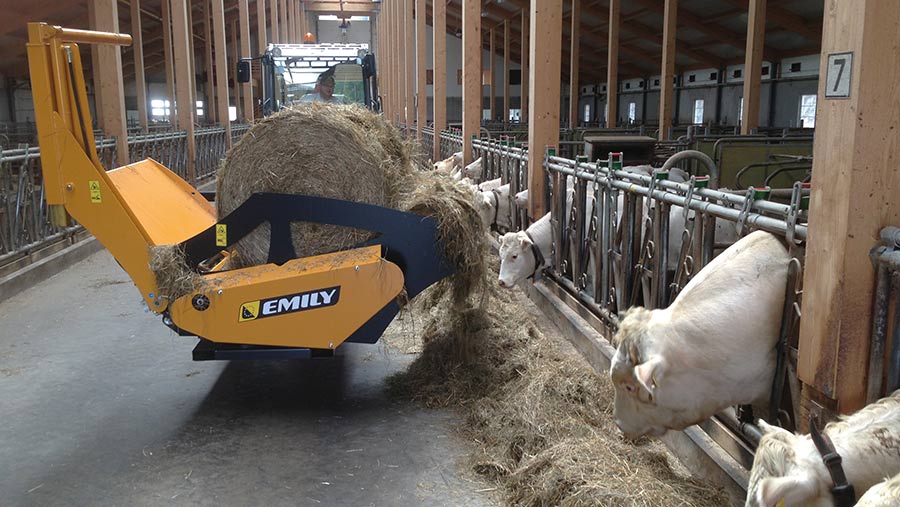
The Emily Delta turntable bale unroller with integral loading arm © Emily
The Pick & Go from Emily is one of a family of implements operated on a spike-tined headstock carried on tractor linkage, loader or telehandler.
In addition to the standard unroller there is a dry feed mixing-feeding box and a combined bale unroller and straw spreader.
These are quickly interchangeable with a sweeping brush and single-tyre silage pusher.
Rather than engaging tubes in the bale unroller frame, the 120cm-long tines fit into slots in the underside of the machine, with hooks engaging bars to take much of the implement’s 650kg weight.
Toothed wheels automatically engage to transfer hydraulic drive to the unrolling mechanism, which consists of spiked, U-shaped slats on two chains over a Teflon-coated floor.
There are left- and right-hand dispensing versions, both capable of handling bales of 1-1.8m diameter, and there is a bale retention kit to contain irregular-shaped bales.
Emily’s Delta model is a turntable bale unroller that can be rotated by hand or using hydraulic power to dispense forage to either side of a tractor, loader or telehandler, or to the rear of a tractor.
Hydraulic drive speed to the bale-rotating conveyor is adjustable either on the machine or optionally by an in-cab control.
A loading arm with hydraulic telescopic and lifting operation that automatically adapts to any size bale is also part of the Delta package.
Prices: Pick & Go £5,483 to £6,931; Delta £5,959 to £9,336.
Gerety
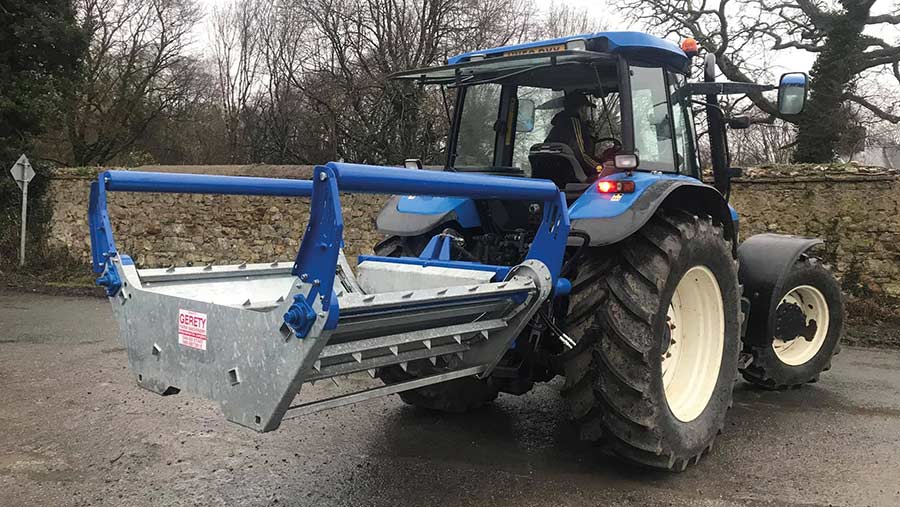
Gerety Balemaster © Gerety
Hydraulic side-shift is a standard feature of the Balemaster, allowing the device to be operated on a large tractor or one fitted with wide wheels and tyres.
This helps keep clear of a feed barrier while still delivering forage within easy reach of the cattle.
The machine is of the spike-loading type, the two 50mm tines being bolted to the headstock unit; they are of unequal length to make things easier when inserted back into the frame after loading.
A latching mechanism engages to keep the two assemblies coupled and the headstock incorporates the hydraulic side-shift mechanism that provides 43cm of lateral movement.
The Balemaster’s conveyor is formed from square-section bars with weld-on spikes and it runs above a stainless-steel floor panel that retains loose material; the rest of structure is fully galvanised.
There are two bale retention rollers – one on each side – to help the feed-out process, especially with saggy or misshapen bales.
Price: Balemaster £5,065 from Gerety Farm Machinery.
Hustler
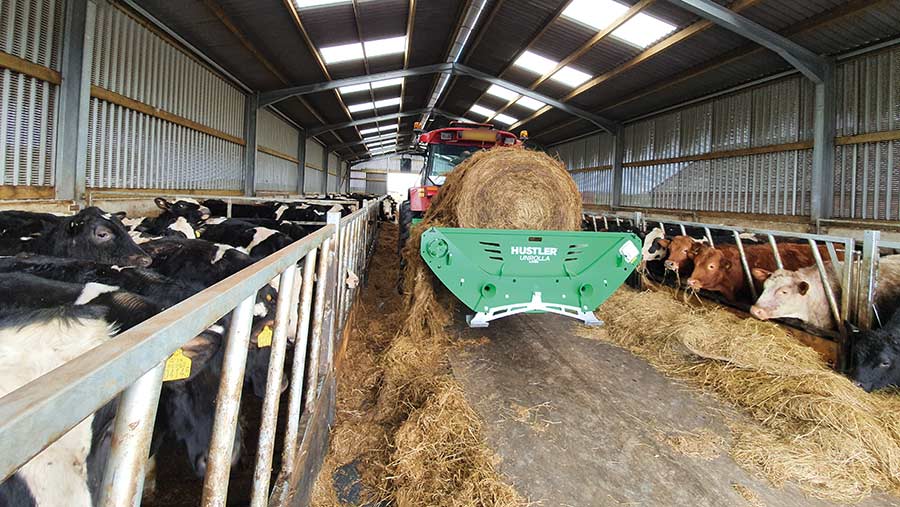
The Hustler Unrolla chain and slat feeder can discharge to either side © Hustler
Two types of bale unrolling machines are built by Hustler – the chain-and-slat conveyor Unrolla for round bales only, and the Chainless models that have side rotors to turn and tease material from the bales.
Both types are available in tractor- or loader-mounted form with tines on a back-plate for loading, and as a trailed machine with rear-mounted hydraulic loading forks that can also carry a second bale to the dispensing destination.
The Unrolla LM105 is the entry-level model for tractors or loaders; it has a rope pull to release a securing latch so that the tines can be withdrawn for loading, and there is single-lever control of dispensing speed and left- or right-hand discharge.
The LM105T has an extension conveyor for dispensing into a trough or over a feed barrier that can be adjusted by hydraulic cylinder to the feed-out position or vertically for transport.
The LX105 is a heavier-duty model with added strength coming from components such as the galvanised “bridge” structure incorporating the feet. It can also be attached from either end and has an auto latching and release mechanism.
Features common to all three models include a low-friction polyethylene conveyor floor that retains loose material, self-aligning bearings for the rollers, covered roller drive shafts, and large guide cones to help locate the spike tines when re-engaging the back-frame.
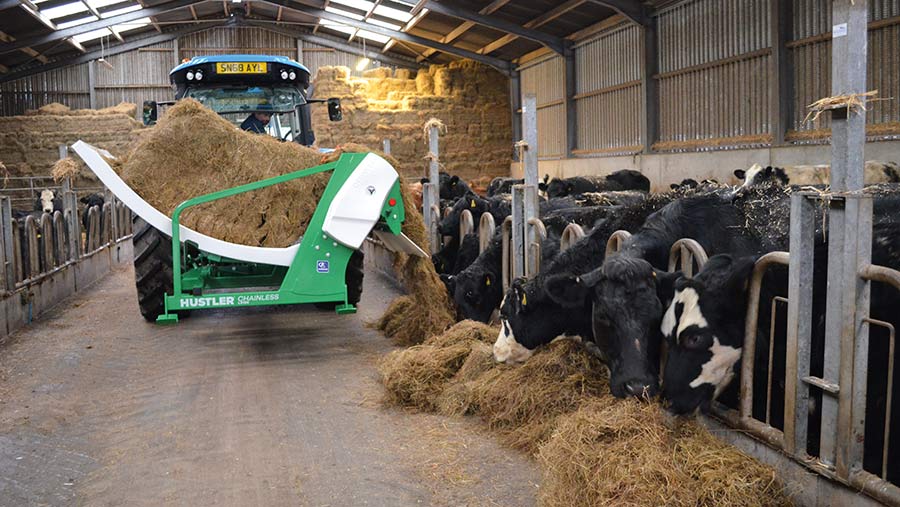
Hustler Chainless feeders have a tilting polyethylene deck and rotors instead of a chain and slat conveyor © Hustler
These features also apply to the Hustler Chainless LM104 weighing in at 640kg and the heavier-duty LX104 and LX105, built for round bales up to 1.2m and 1.52m diameter, respectively, and also capable of handling square bales.
A hydraulically raised and lowered polyethylene cradle sits low to the ground for loading before being raised to keep the bales engaged with two low-speed horizontal rotors.
Rotating with a three-to-one speed difference, they tease material from bales weighing up to 1.5t, dispensing to one side only, with rotor teeth passing through cleaning slots.
In addition to the rear-mounted, self-loading tines, the trailed versions can have a moulded twine and wrap box located at the front, a side chute giving extra dispensing reach, and a platform extension for 1.24m-long square bales.
An “even feed” roller positioned above the rotor of Chainless models is designed to help break up the densest square bales.
Prices: Tractor-mounted Unrolla from £4,970, Chainless from £7,910.
Lucas-G
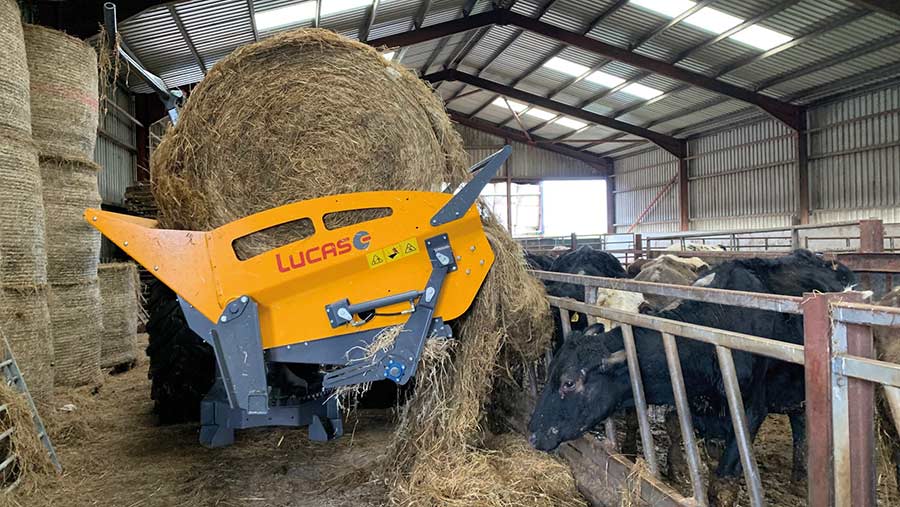
The UBI feeder from Lucas-G has a hydraulic bed tilting mechanism for loading and to help regulate the feed-out process © Lucas G
A tractor-mounted model with telescopic loading arm is the 710kg entry-level machine in the UBI range from Lucas-G.
For loading, the unrolling bed and fixed arm are pivoted by a hydraulic cylinder through almost 90deg, the telescopic section of the arm is pulled in and the machine pivoted back to its working position with the bale on board.
Bales up to 1.2m diameter are unrolled to the right using an open conveyor assembly with spikes on the broad U-shaped slats, with a restraining bar above the discharge point to keep bales – especially misshapen ones – on the conveyor.
The UBI Swivelling version, weighing 880kg, has a 180deg hydraulically powered turntable enabling discharge to right, left or behind the tractor.
Lucas-G’s UBI Pic bale unroller is detachable from a tined back-frame designed for use on a loader to retrieve and place a 1.2m-diameter bale on the unrolling conveyor.
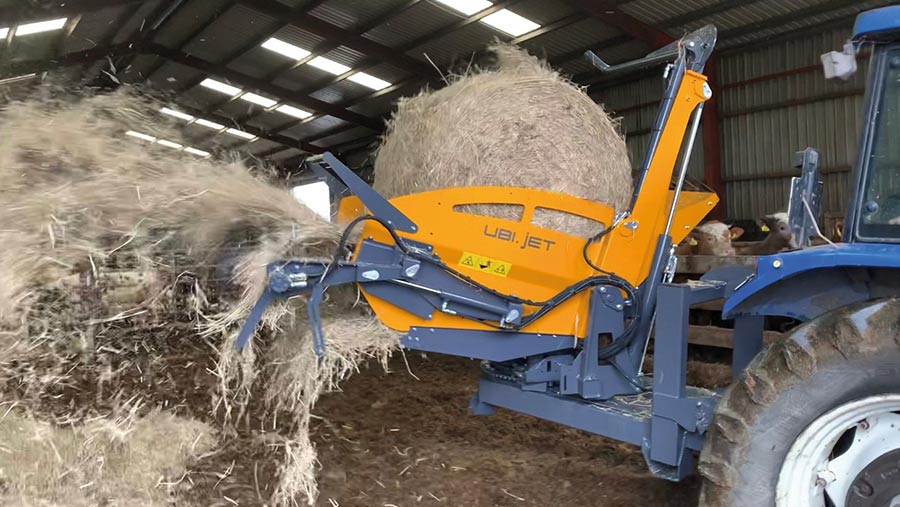
Lucas-G’s UBI Pic bale unroller © Lucas G
In standard form, each of the conveyor slats has fixed teeth; but as an option, a retracting tooth mechanism designed to minimise the likelihood of forage or straw being carried around the underside can be fitted.
While the loader-only Pic Fix version of this machine has a static unrolling bed, the Pic model available for loader or tractor linkage operation has hydraulic tilt adjustment that can be used regulate bale rotation, which is influenced by the bale’s shape and density.
UBI Jet models based on the UBI Swivelling come with a teasing tine rotor or two spinners for spreading straw (see “Want to spread bedding straw?”).
Prices: UBI from £5,250; UBI Pic £6,500; UBI Jet £9,625; UBI Jet Disc £9,000.
Nugent
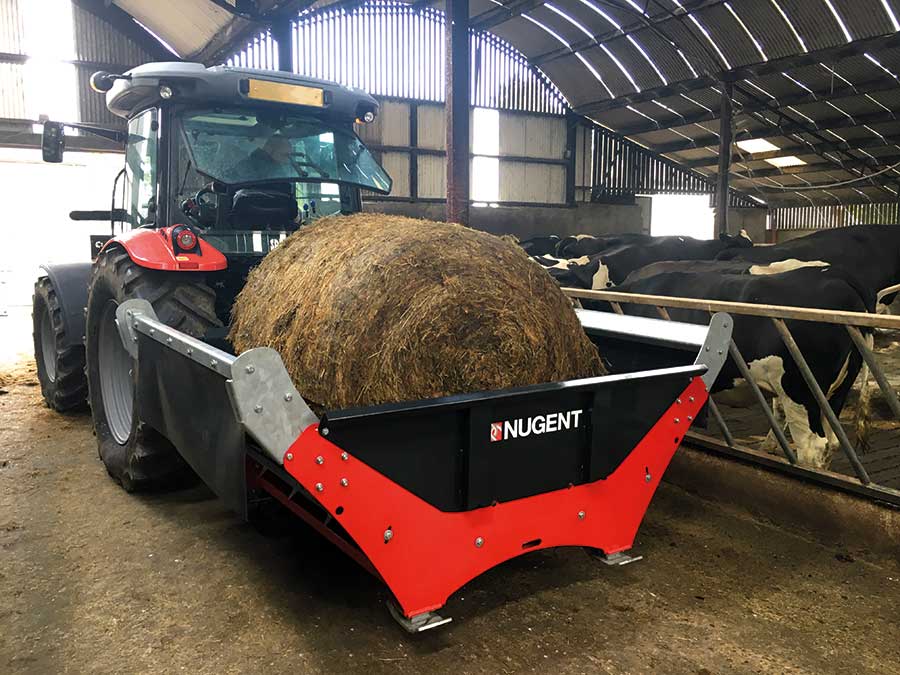
Nugent Bale Feeder © Nugent
The Bale Feeder from Nugent Engineering is a symmetrical unroller that can discharge to left or right via the hydraulic motor drive.
The painted device, which is configured for use on tractor three-point linkage, a tractor loader or telehandler, stands on individual galvanised feet during loading, when the built-in tines on the headstock are withdrawn from tubes in the structure.
Guide cones help re-engage the tines once a bale has been placed on board, with a lug-type coupler engaging the hydraulic drive and an auto-latching mechanism holding the two sections of the machine together.
Bales are rotated by a chain and slat conveyor assembled using zinc-plated chain and spiked square-section bars, which run over a low-friction, polyethylene floor that prevents loose material falling through.
A rear guard panel that also prevents overspill is standard and a bale restraining bar with hanging rubber flaps can be added above one or both discharge points to keep soft or misshapen bales in place.
Price: from £5,500
Suire
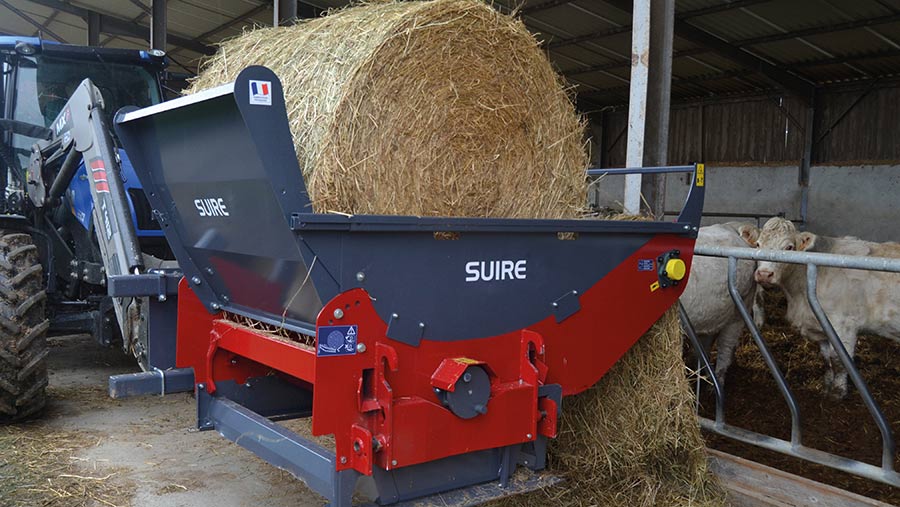
Base model Suire DF bale unroller has a short conveyor and a loading arm option © Suire
Starting with the entry-level DF model, Suire offers several bale unroller configurations to suit operation on tractor linkage, tractor loader and telehandler, all capable of handling round bales weighing up to 1t and 1.8m in diameter.
The 475kg DF discharges to the right when operated on the back of a tractor, using a conveyor formed from U-shaped spiked slats and chains running around lugged rollers for positive drive.
The conveyor extends from only half way across the machine, so is shorter than most, with a lining beneath to prevent loose material falling through, and an extension conveyor is available for added reach.
A curved steel sheet completes the bed of the standard model, but when the optional side-mounted loading arm is fitted, a flat steel sheet forming part of the loading arm fulfils this role in the raised position.
The arm itself has a manually or hydraulically adjusted telescopic end section to adapt to bales of different sizes and manual or hydraulic offset is available to shift the machine 20-60cm sideways.
A similar option with 30cm side-shift left and right is available for the 630kg Suire DALM and heavier-duty DM weighing 755kg.
For added versatility, these have the same bale unrolling structure mounted on a turntable with locking positions for left, right and inlined rear discharge.
Suire’s Rollpick Pro F is an alternative with built-in bale spiking tines for loading bales up to 2m diameter and an automatic mechanism for locking and releasing the latches that secure the two parts of the implement together.
When the machine is lowered to the ground, a pair of locking pins are withdrawn as a full-width skid is forced upwards.
They are re-engaged when the skid drops as the machine is lifted, having been loaded using the two 40mm tines.
The Rollpick is available with welded or bolted linkages for tractor, loader and telehandler mounting, and a second hitch-and-drive coupling can be added so that the device can be approached from either end for left- or right-hand discharge.
Bales up to 1.5m diameter are suitable for unrolling, or up to 1.8m when using the optional straw spreading device, a feature also available for DALM (see “Want to spread bedding straw?”).
Prices: DF from £4,600; Rollpic Pro F from £6,500 (tractor), £7,100 (tractor loader) and £8,000 (telehandler) or £14,000 with a straw spreading device; DM-P (rotating tractor-mounted with straw spreading tines) from £8,000; DM-ET (as DM-P but with electronic controls for telehandler operation) from £16,000.
Distributor: Abrey & Son
Wessex
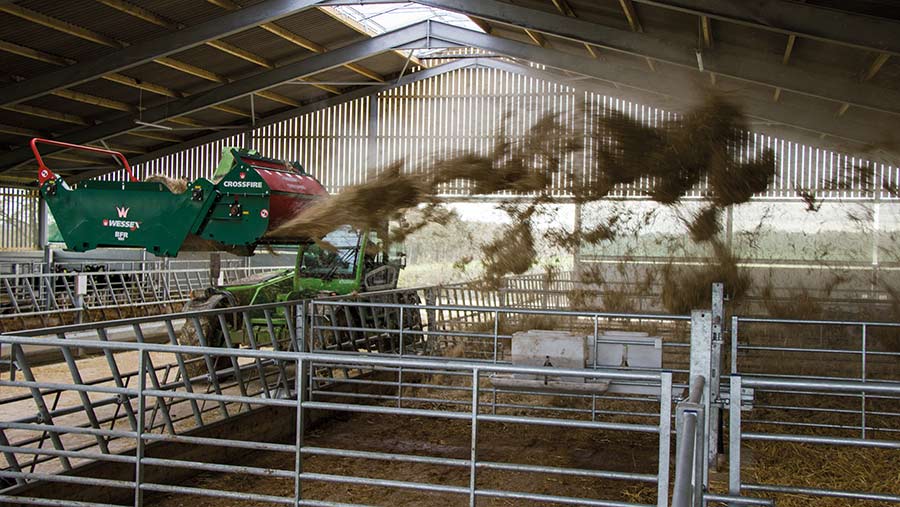
Wessex BFR-180 Crossfire © Wessex
The BFX-180 is the simplest of two round bale unrollers from Wessex International, both capable of handling bales weighing up to 1t and measuring up to 1.8m in diameter.
In base form, the BFX-180 comes with an open-sided table formed with a symmetrical frame, a conveyor comprising cross bars with bolt-on spikes and roller chains, and a high-density polyethylene floor.
This layout, together with reversible hydraulic drive, enables the machine to dispense bales to left or right, with optional front and rear bolt-in plates available to keep loose material – and other types of feed – within the conveyor bed.
For bales that are less than perfect, a containment rail can be added above each of the two discharge points.
When loading, a pair of bale spiking tines bolted to the headstock are withdrawn from the frame after a locking latch with rope pull has been lifted; the Quicklatch automatically engages after a bale has been put in place and the tines returned to the machine lifting position.
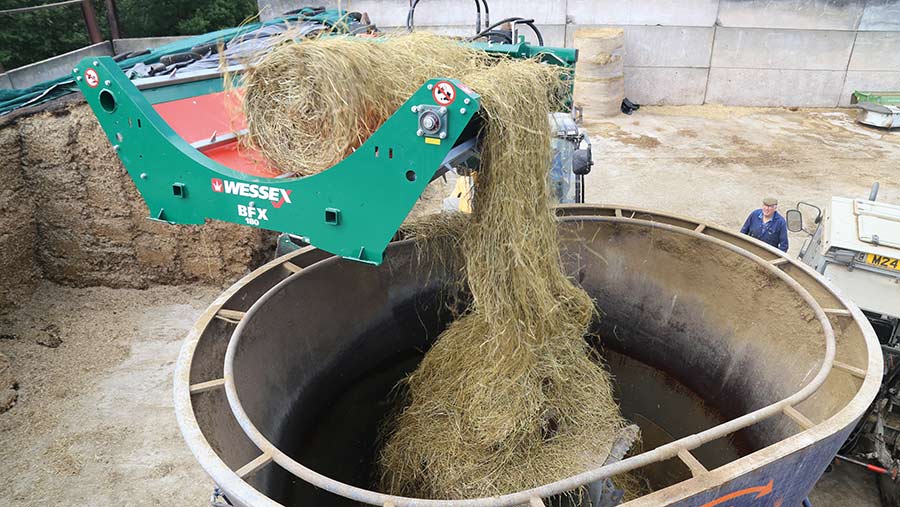
Wessex BFX-180 unroller © Wessex
The BFX-180 weighs 525kg for use on tractor linkage with optional 500mm offset brackets, or with bolt-on couplings for a tractor loader or telehandler plus 800mm offset brackets.
Elevator and straw spreading options are a feature of the Wessex BFR-180, which is similar in concept but built with a heavier-duty structure that includes an integral back plate, a front-end cover on the headstock and bars over the extremities of the conveyor to keep bales on the bed.
The Sidewinder conveyor extension adds 230kg to the machine’s 770kg base weight and delivers forage at greater height to the left-hand side into a trough or manger, with standard height discharge to the right still available.
Prices: BFX-180 from £5,680; BFR-180 from £6,580 (£3,250 for conveyor extension, £5,200 for straw spreader).
Want to spread bedding straw?
If you need to spread bedding straw into stock pens and like the idea of dual-purpose equipment, then there are several machines that can do both.
Altec’s swivelling DR-P comes in two sizes for bales up to 1.7m and 2m in diameter, with or without a hydraulic loading arm. These can be equipped with two rows of rotating teaser tines to distribute to left or right over a distance of 5-8m from outside the pens.
With the hydraulic drive turned off, the rotor released at one end and swung round to the side, the machine can be used as a feed bale unroller.
Alternatively, a pair of spreading discs distribute straw from behind a tractor working inside a pen, distributing across 5-6m, with up to 8m available as an option.
Emily’s Unroller Spreader in its Pick & Go range of implements is carried on a back-frame with tines for loading bales.
It dispenses forage from a bale by unrolling to one side and spreads straw from a high-speed undershot rotor from the other side; there is also a variant that can unroll to either side as well as spreading from one side.
Although the bale-loading tines engage with slots underneath the machine, much of the weight is supported on coupling hooks, and the hydraulic drive connects automatically.
It can be tractor-linkage, loader or telehandler mounted and typically throws straw 8m, says the manufacturer.
The Lucas-G UBI Jet is based on the UBI Swivelling side loading-arm model and comes with a hydraulically retractable flexible tine spreading assembly.
The tractor linkage-mounted machine with its turntable body will distribute up to 5m to the left, right or behind the tractor, with the alternative spinning disc system covering 6m to the rear.
Optional hydraulic rotation of the turntable on Suire’s DALM enables it to cover 10-14m in one pass from the back of a tractor operating inside a pen, and a “super elevator” hydraulic lift option enables it to clear feed barriers and so operate from a passage spreading 5-7m left or right.
There is a spinner option, too, using a pair of 960mm-diameter discs to spread across up to 9m, with a restrictor bar above the feed-out end of the bale rotating/feed conveyor to help regulate straw delivery.
Tractor loader or telehandler operation is also possible with the relevant mountings added.
Crossfire is the name given by Wessex to the bedding module for its BFR-180 bale unroller, which comprises an enclosed, high-speed undershot tine rotor capable of sending straw up to 10m into a pen.
Ideally mounted on a loader, the Crossfire shoots to the left, with the conventional low-level bale unrolling function to the opposite direction still available.

